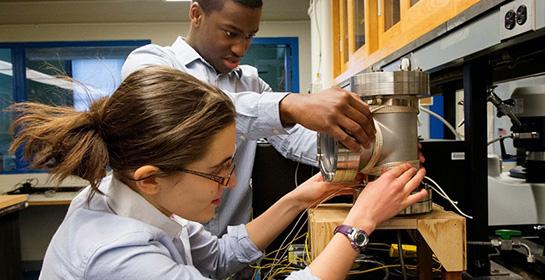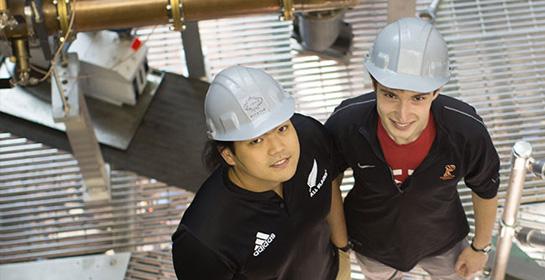Graduate and undergraduate students are an integral part of the PSFC community. Students are embedded in many of the teams, operate experiments, collaborate with other labs, and contribute at all stages of research.

An important part of the PSFC's activities involves training students who make valuable contributions to the research conducted at the Center. Undergraduate students have an opportunity to work closely with PSFC researchers on projects ranging from experiment design and technology development, to data analysis. These opportunities are usually coordinated through the MIT Undergraduate Research Opportunities Program (UROP) or by doing a Senior Thesis in plasma science and fusion.
For MIT students, visit the PSFC Student Positions page to view available undergraduate opportunities.
For questions about UROPs at the PSFC, contact psfc-urop@mit.edu
To find open UROPs coordinated through the Department of Nuclear Science and Engineering, visit nurop.scripts.mit.edu/UROP (Note that some positions posted on the PSFC Student Position page may or may not also be posted on the NSE UROP page.) Visit the FUSars page to learn more about the Fusion Undergradate Scholars program, or to apply for the upcoming cohort.
To learn more about doing a Senior Thesis with a PSFC advisor, contact info@psfc.mit.edu.
To learn more about applying to MIT, visit mitadmissions.org.
PSFC Faculty and Researchers can post open undergraduate student positions using this form.

The PSFC is one of the largest producers of plasma physics PhDs in the world. However, the Center is not a degree granting body and instead draws students from MIT academic departments. Since plasma physics and fusion are by nature interdisciplinary subjects, students who perform research at the PSFC satisfy their educational goals by residing at any of several departments, six of which are associated with the PSFC. Each department has its own admission procedure, requirements, and offers a number of plasma-related courses, many of which are taught at the PSFC by PSFC-affiliated professors. Check the departments below to see a complete list of their course offerings and for further information about how to apply:
Course 2: Mechanical Engineering
Course 3: Materials Science and Engineering
Course 6: Electrical Engineering and Computer Science
Course 8: Physics
Course 10: Chemical Engineering
Course 16: Aero & Astro
Course 22: Nuclear Science & Engineering
For a detailed list of all courses available to MIT students, please look at MIT Subject Listings and Schedule, found in the on-line MIT Bulletin.
To request further information about graduate study in plasma science and technology please fill out this form.
PSFC Faculty and Researchers can post open Master's and PhD student positions using this form.
For MIT students, visit the PSFC Student Positions page to view available openings.